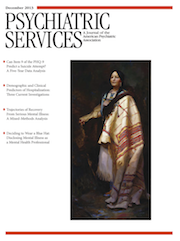ICD-11 and DSM-5 Classifications: A Survey of Japanese Psychiatrists
To the Editor: The World Health Organization is currently working on the 11th revision of the International Classification of Diseases (ICD-11) (1), and DSM-5 (2) was released in May 2013. Some criticized the process of developing DSM-5 (3). Thus we thought that it would be worthwhile to investigate how Japanese psychiatrists view the ICD and DSM revision processes and how they would like the diagnostic classifications to change.
The aim of this study was to clarify how ICD-10 (4) and DSM-IV-TR (5) have been perceived in clinical, administrative, and forensic settings in Japan. In addition, we solicited opinions on the diagnostic classifications proposed for ICD-11. A questionnaire was mailed in February 2011 to 452 members of the council of the Japanese Society for Psychiatric Diagnosis and 80 chief professors from every psychiatry department at universities in Japan. They were asked to provide their opinions and perspectives on issues regarding diagnostic classification in general, rather than on specific disorders or domains in the ICD-10 and DSM-IV-TR.
Data were collected from 245 respondents (response rate of 46%), of which 219 were men and 26 were women. The mean±SD age of respondents was 50.0±12.9 years, and the mean length of their experience as a psychiatrist was 23.9±12.4 years. [A table presenting the 12 questions and the responses is available in an online data supplement to this letter.]
Survey results appeared to indicate that respondents were rather hesitant about making major changes, such as reorganizing the classification system. The coexistence of two major diagnostic systems, namely the ICD and DSM, has been a concern among many clinicians. The Research Domain Criteria proposed by the National Institute of Mental Health in the United States were favorably seen by Japanese psychiatrists; 74% approved this approach.
Hesitation about making major changes was evident in responses to an item about recent molecular genetic research suggesting that bipolar disorder is closer to schizophrenia than to depression. Respondents were not comfortable combining bipolar disorder and schizophrenia as psychotic disorders; instead, 69% agreed that bipolar disorder should continue to be included in the category of mood disorders.
Two items asked about the many “not otherwise specified” (NOS) diagnoses and “comorbid” diagnoses that are yielded by the ICD-10 and DSM-IV-TR. Responses indicated a desire that revisions to the classification systems would lead to fewer such diagnoses; however, many respondents acknowledged that NOS and comorbid diagnoses were an unavoidable outcome of using operational diagnostic criteria.
These results were obtained from Japanese psychiatrists and therefore cannot be generalized to psychiatrists worldwide. However, we hope that these findings will help inform ICD-11 revision efforts.
1
2 Diagnostic and Statistical Manual of Mental Disorders, 5th ed. Arlington, Va, American Psychiatric Association, 2013Google Scholar
3 : Whither DSM-V? British Journal of Psychiatry 195:391–392, 2009Crossref, Medline, Google Scholar
4 International Statistical Classification of Diseases and Related Health Problems, 10th Revision. Geneva, World Health Organization, 1992Google Scholar
5 Diagnostic and Statistical Manual of Mental Disorders, 4th ed, Text Revision. Washington DC, American Psychiatric Association, 2000Google Scholar



